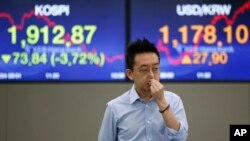South Korea's government lowered growth outlook for Asia's fourth-largest economy and planned a supplementary budget for a second year in a row as the global economy faces heightened uncertainty.
The Finance Ministry said Tuesday that the economy will likely expand 2.8 percent this year, down from its December prediction of 3.1 percent. That would mark a slight improvement from last year but slower growth than 2014.
Jobs would be a primary goal as the government plans a 10 trillion won ($8.5 billion) supplementary budget during the second half of this year. The additional budget, pending parliamentary approval, would be used to support big projects that create jobs. In addition to the extra budget, the government would prepare a stimulus package that would total more than 20 trillion won, it said.
Regarding lowering its growth forecast, the government cited a deterioration in global conditions for exports, South Korea's key growth engine. The International Monetary Fund cut in April its outlook for the world economy and trade.
South Korea's government estimated that the direct impact from the result of Britain's vote to leave the European Union is expected to be limited. But there are concerns about negative repercussions from the increased uncertainty in the global economy and financial markets, it said.
“We will beef up our efforts to improve domestic spending in response to Brexit and other worsening conditions overseas,” Finance Minister Yoo Il-ho told a briefing.
Global financial markets were rattled by Britain's vote to leave the union. South Korean stocks and currency also fell sharply along with other emerging market stocks and currencies. The main stock index in Seoul recovered this week and the government said it will monitor any fallout from Britain's vote.
During a meeting with economic policymakers earlier Tuesday, South Korea's president said the result of Britain's vote was “unexpected.”
“As external uncertainty increased due to Brexit, we ought to step up managing risks in our economy's weak areas,” Park Geun-hye said according to a South Korean press pool report. “As Brexit may ignite an enormous change in the future, we need to read the big picture for the mid to long term and review our economic strategies.”
South Korea also faces other economic headwinds at home. The government expects that companies will sharply lower their capital expenditures as sluggish exports continue. Corporate restructuring at cash-strapped shipbuilding and other industries could hurt job markets and corporate spending, it said.
The government said consumption may be dampened by an anti-corruption law that is set to take effect in the fall. The law to fight corruption bans government employees, school teachers and journalists from taking expensive gifts, which some worry will dent sales of agricultural products and other popular gifts.







